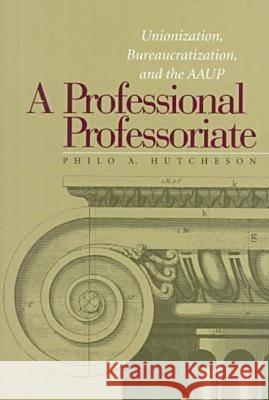Professional Professoriate » książka
Professional Professoriate
ISBN-13: 9780826513489 / Angielski / Miękka / 2000 / 288 str.
Professional Professoriate
ISBN-13: 9780826513489 / Angielski / Miękka / 2000 / 288 str.
(netto: 207,91 VAT: 5%)
Najniższa cena z 30 dni: 182,87
ok. 16-18 dni roboczych.
Darmowa dostawa!
Starting with the question -How have professors and educational institutions responded to pressures to be professional yet act bureaucratically, - Philo Hutcheson uses federal and AAUP records and surveys and blends historical research and sociological analysis to develop a full understanding of the problem. With the dramatic expansion of the professoriate following World War II came increasing tensions between the professor's perceived traditional status as an autonomous professional on the one hand and new role as a bureaucrat subject to institutional authority and responsible for departmental and committee assignments on the other. In this increasingly conflicted realm, the AAUP functioned as a key intermediary, dealing with such issues as tenure, salary, contracts, and even faculty strikes.
Hutcheson examines how tensions between the requirements of institutional bureaucracies and the norms of the academic profession resulted in contentiousness and conflict within the national AAUP, between administrators and faculty members on individual campuses, within the ranks of faculties themselves, and even deep in the consciences of many concerned individuals. The book analyzes the association's ability to respond effectively and to balance the values of collegial representation with the powers of collective bargaining. It thus offers a detailed and authoritative examination of the AAUP's search for ways to sustain professionalism while dealing with the fundamental changes in the nature of the professoriate in the post-World War II era.











